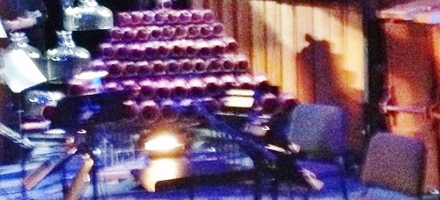Say you're a composer or presenter of "serious" modern music. You want to mix instruments with words. You look around, and you find the words/music combination often blowing up in musicians' faces. (The "Night of the Beats" at Disney Hall a few years ago comes to mind.)
If you're director Brian Carbine, conductor Chris Rountree and composer Anne LeBaron, you do it anyway. The result was an awkward balance that detracted from Microfest's otherwise excellent realization of the late Harry Partch's and the living LeBaron's music by the microtonalist ensemble called Partch, the Isaura String Quartet and allied performers. As the Wicked Witch said, these things must be done delicately, and here they kinda weren't.
Things started well, maybe because there weren't many words yet. Trumpeter Daniel Rosenboom and baritone saxist Ulrich Krieger did a masterly job of interweaving the Spanish melodies and handling the difficult ritards and fast runs Partch had intended for Chet Baker and Gerry Mulligan (who never played them) in his 1955 "Ulysses at the Edge of the World." Monster marimbas and crisp microtonal percussion on little clay bowls, meanwhile, opened exciting dimensions.
Partch's attempts to orchestrate Lewis Carroll's "Jabberwocky" and "Lobster-Quadrille" came off worse. What did Partch intend by ignoring Carroll's strong rhythms, replacing them with goofy accents and causing the words to be sung with annoying melodies? If he wanted to pull off a konceptual komment -- contrasting 1954 absurdity against 19th-century absurdity to illustrate the deeper ugliness of modern life -- he disrespected the text, flushed the charm and replaced whimsy with indignity, which just plain ain't worth doing. He didn't need to ruin a classic; modern degradation speaks for itself. (Carroll isn't inadaptable; Walt Disney's 1951 animated film of "Alice in Wonderland," though not deathless art, did much less to damage Carroll's legacy, and Oliver Wallace wrote clever music for it.) Among the wonders wasted in this piece: the shivery slides of that vertical zither, the subliminal sonorities of the big marimba and the harpsichordish echoes of the microtonal keyboard.
Despite the snappy sounds and harmonies of pennywhistle, oboe and microtonal circus organ, despite its title tune's greater potential for subversion, despite its antiwar message, and despite Partch making fun of his own 43-tone scale, "Yankee Doodle Fantasy" (1944) was Just silly, pun intended. Same for Partch's stumbling Jerry Lewisisms in "Sonata Dementia" (1950) -- I loved the gut resonance of the huge two-note bass marimba, hated it that counting to 22 or singing stuff like "scherzo schizophrenia" was supposed to be tolerated as Art.
In the five scenes from LeBaron's new "LSD: The Opera," I enjoyed the mini-lessons in lysergic history from 1943 onward, and the use of the Isaura String Quartet to expand the Partch ensemble. At least I think I enjoyed them, because I kept getting distracted by the activities of several well-trained operatic vocalists (including Ashley Faatoalia as acid inventor Albert Hoffman and Timur Bobeksunov as Timothy Leary), singing passages from the notebooks, memoirs and literary works of scientists and authors such as Hoffman and Aldous Huxley. These words were usefully projected overhead, and that's where they should have stayed; since the syllables rarely possessed intrinsic musical properties, subjecting them to jagged microtonal notation and vibrato-laden vocal bombast launched the ears and mind on a bad trip. LeBaron, who emotionally thanked the musicians at the end, seemed most sincere, though, and I bet she's an authentic initiate (16 at the time of Woodstock) who knows whereof she writes.
As for Harry Partch, creator of so many instruments and opportunities, his own structures as usual generated polar swings between fascination and irritation. Judging by his description of "Sonata Dementia" as a satire on, among other things, concerts, concert audiences and nothing, he wanted it that way; he took pride in his lack of convictions. Too bad that convictions are one of the factors that distinguish a major composer from a minor one.
* * *
PHOTOS BY FUZZY BAROQUE.

